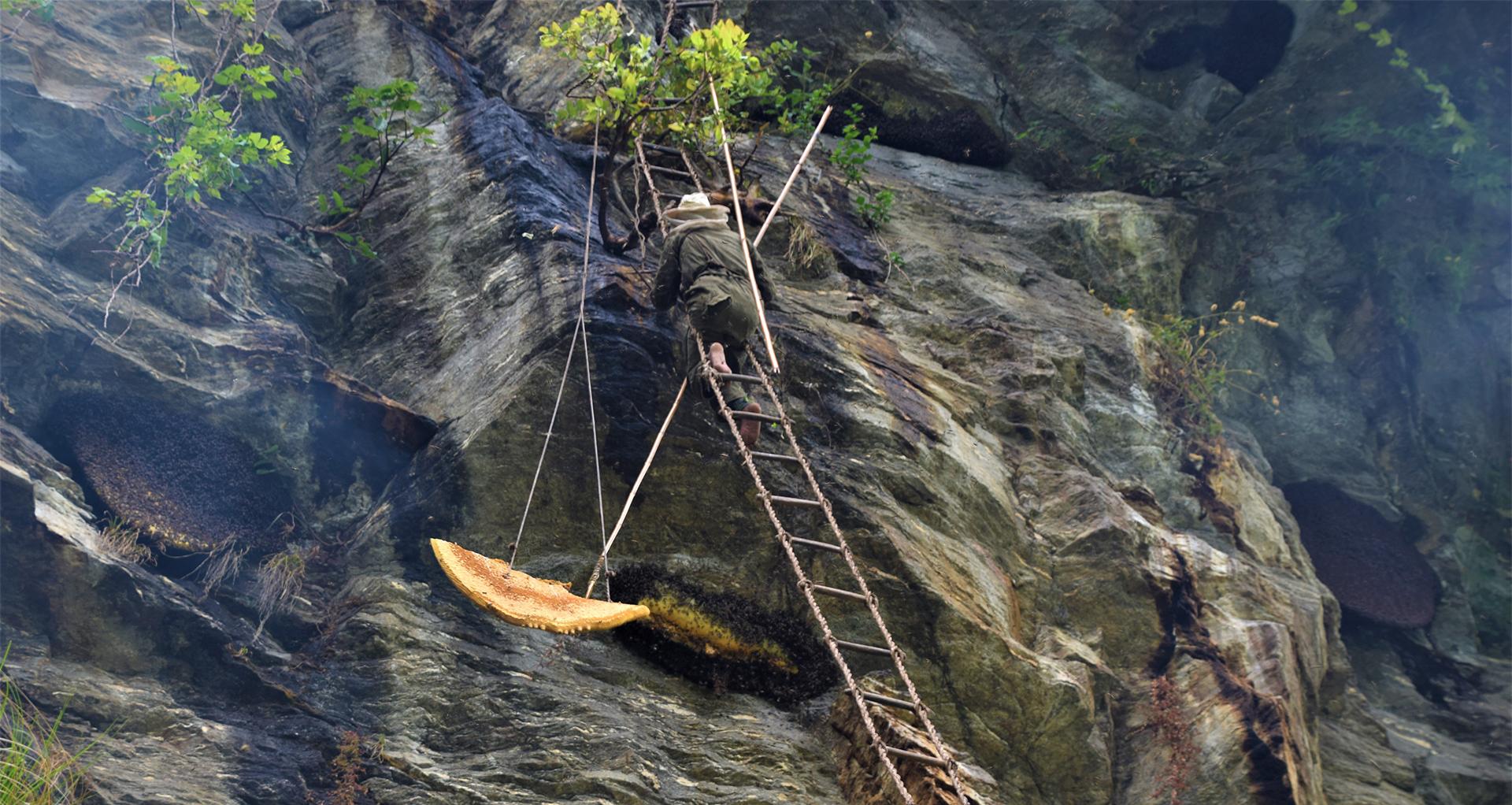
High in the rugged cliffs of Nepal, the Gurung honey hunters perform one of the world’s most dangerous and awe-inspiring rituals. Hanging from handmade bamboo ladders, these brave men risk their lives to harvest wild Himalayan cliff honey produced by the world's largest honeybee, Apis laboriosa.
This ancient tradition, passed down through generations, is more than just a means of livelihood—it's a sacred ritual embedded in the Gurung community’s cultural heritage. The harvest is accompanied by spiritual ceremonies to appease forest spirits, highlighting the deep spiritual connection between nature and tradition.
However, this intangible cultural heritage is under threat. Rapid deforestation, climate change, and modernization are disrupting bee habitats and discouraging younger generations from continuing the practice. Efforts are now underway to preserve this unique tradition before it vanishes from Nepal’s cultural landscape.
In the heart of Nepal’s Lamjung District, the Gurung people uphold a centuries-old tradition that is as breathtaking as it is dangerous—honey hunting from Himalayan cliffs. This unique cultural practice involves harvesting wild honey from colonies of Apis laboriosa, the world’s largest honeybee, found in vertical rock faces and remote mountain crevices.
Skilled hunters, known locally as Khudke, scale these sheer cliffs using handcrafted bamboo ladders and ropes, often hundreds of feet above the ground. Armed with little more than smoke torches to calm the bees, they brave swarms and heights to carefully extract the honeycombs—an act demanding extraordinary courage, balance, and ancestral knowledge.
The wild honey they collect is not only rare and valuable, but also revered for its medicinal and hallucinogenic properties, especially the first harvest of the season. This tradition is deeply embedded in Gurung cultural identity and livelihoods, often accompanied by rituals that honor nature and spirits.
Yet, this ancient practice is under threat. Deforestation, climate change, and modernization are disrupting bee habitats and discouraging younger generations from learning the craft. Without sustainable protection, this remarkable tradition may disappear into history.
ACCOMODATION
TRANSPORTATION
One of our representatives will pick you up at the airport to accompany you to the hotel. Depending on the arrival time, we will visit some of the most important places in the capital. Meeting at night in the hotel for the briefing of the entire trip.
ACCOMODATION
TRANSPORTATION
MEAL
First half of the day, we will prepare our gear and equipment for the expedition and we will explore the historically and culturally rich Kathmandu Valley. Highlights include leisurely tours of Swayambhunath Temple (also known as Monkey Temple), Bauddhanath, Pashupatinath Temple, and Durbar Square. Before starting our rural cultural exploration, we can soak in these iconic sites that represent the essence of Kathmandu and the heritage of Nepal.
ACCOMODATION
DURATION
TRANSPORTATION
MEAL
After having breakfast, we will start our journey by road drive to Besisahar in a private jeep or van. Road conditions are not so good so it will take us around 8 hours to reach our destination for the day, Besisahar.
ACCOMODATION
TRANSPORTATION
MEAL
Leaving the city area, we will head towards some of the rural villages of Lamjung district. We will drive around three hours by private jeep on bumpy roads to reach our destination village. We will explore naturally and culturally reach alleys of the village in the evening and overnight there at homestay.
ACCOMODATION
MEAL
The village is inhabited by the indigenous Gurung people who are renowned for their skill in honey hunting from Himalayan cliff beehives. The village retains its traditional lifestyle and unique ethnic culture with mud-brick houses, subsistence farming and livestock rearing practices. The village offers stunning views of the Annapurna Himalayan range and serves as a base for trekkers on the Annapurna Circuit trail.
ACCOMODATION
MEAL
We will depart from the village, embarking on our extraordinary honey hunting expedition. Our journey will take us deep into the heart of the Himalayan forests, where we will pitch our tents and spend the night amidst the untamed wilderness. With eager anticipation, we will witness every intricate process of this ancient tradition, as the skilled traditional hunters fearlessly scale the treacherous cliffs to harvest the precious wild honey. This rare and immersive experience will etch itself into our memories, leaving us with once-in-a-lifetime recollections that will forever be cherished.
ACCOMODATION
MEAL
Upon completing our awe-inspiring honey hunting expedition, we will make our way back to the village, eagerly anticipating an encounter with the unbelievable traditions that unfold only on the full moon of a specific month each year.
ACCOMODATION
MEAL
As the lunar cycle reaches its zenith, this remote mountain community comes alive with a tapestry of rituals and customs that have been woven into the fabric of their culture for generations. We will bear witness to age-old practices that have been meticulously preserved, unveiling a world that few outsiders have had the privilege to experience. These traditions, steeped in mystery and meaning, will leave an indelible mark on our souls, forever etching this extraordinary journey into our memories.
ACCOMODATION
DURATION
TRANSPORTATION
MEAL
Finally after completing our expedition we will drive back to Kathmandu. It will take us around 12 hours to reach Kathmandu
ACCOMODATION
MEAL
We will have one day as a reserve day for some unseen situations if they arise during our expedition. Or we will rest one day in Kathmandu to recall the whole journey and to relax our body and mind.
TRANSPORTATION
You will be dropped off at the airport in a Van or jeep prior to your flight departure time.